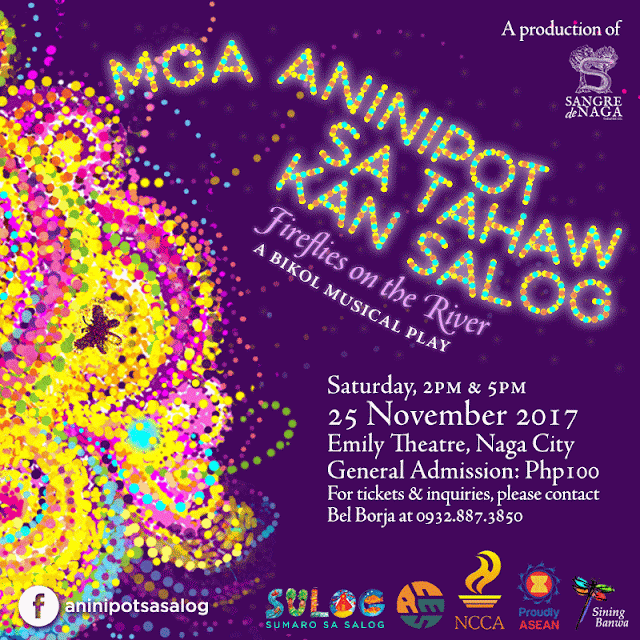A provenance or a tongue?
Vox Bikol, 17 May 2012
I AM a Bikolano. I was born in Bikol. I grew up breathing Bikol air. Even up to now, I am in Bikol; I work here, I spend my earnings here. I eat my breakfasts, lunches, dinners, and take my meriendas here. I utter or contemplate on my prayers in Bikol. I talk to my friends, loved ones and even strangers in Bikol (first, then use another language if my language is strange to the stranger). I transact with other people in Bikol. I am not surprised if dreams come to me in my sleep like clips of films with screenplay penned in my own language. I write in Bikol, of Bikol, for Bikol. The Bikol tongue—or one of its component languages—was, is and will continue to be my first language.
But if I did not write in my tongue, like what I did here, would it make me less Bikolano?
I ruminate on this thinking of the many Bikolano writers who, in their respective successes and contributions to both indigenous and global cultures, are writing in languages other than ours. I ruminate on this imagining the possibility—or impossibility—of losing the marks of one’s provenance because of language. I ruminate on this because I, at times, write too in other languages.
In Carlos Aureus’s book of stories, Nagueños, the reader has no other choice but to wander and wonder like an urchin lost in the labyrinthine grids of Naga City streets. Along and in these streets, he or she will meet Rick Caceres, Cynthia Dee, Pandora, Epifanio Bagting, Suzette, Sid and Tanya, Rosing, Father Itos, Naty Angeles, and other individuals, Nagueños, all they are, in thoughts, in words, in deeds. And yet, the stories in Nagueños are in English. Does its employment of another language exclude it from what is ordained as Bikol literature?
In Merlinda Bobis’s novel, Banana Heart Summer, we travel to a small town at the foot of perpetually simmering volcano to get to know intimately the coming-of-age story of a 12-year old girl named Nenita. Her story, however, is a unique timeline of human struggles, frailties, longings and love flowing inside the digestive tracks of Bikolanos along with the most endearing of our dishes—baduyà, biniríbid, chicken stewed in coconut, gulay na pusò nin batág, and many other tastes of this part of the earth. Yet, again, Banana Heart Summer is penned in English. Is it not Bikol literature, then?
In the often humor-filled fiction of Abdon Balde, he can never be blamed for his rather romantic take on the age-tested symbols of this region. His novel Màyóng, in the citation given when it won the National Book Award, is an “engrossing narrative set in the Bikol Region—set in mellifluous Tagalog or Filipino—one that merges deathless legend and fantastic lore with the romance of present-day realities, in the process weaving a well-told tale of the crossover between the natural and the supernatural”. But the stories of Balde, despite their capacity to bring the Bikolano to a most lucid sense of self, are written in Filipino. Is it not Bikol literature, then?
I ruminate on this because we are talking here of provenance, which is something that transcends manifestations that are limited to the constraints of human perceptions and penchant for labels. Rather, as far as the Bikolness of oeuvres similar to those mentioned here is concerned, we turn to that which can only be proven by faith, that which can only be explored by the heartfelt fathoming of experiences as experienced in our region’s very own context. In the recent Pagsurat Bikol IV, writer-filmmaker Alvin Yapan called it “fidelity” to our region.
Because our Bikol must never be limited to a tongue. Or, to say it in another way, in the context of literature, there can never be a confusion on Bikol as the region and Bikol as the tongue. In the first place, I believe, any place precedes its patois. Yes, a locus is represented and determined through the language spoken therein, but it is more than its language.
Bikol provenance provides us with a spirit, which for writers may be incarnated into written works. These works will always carry the marks, unseen or seen, labeled or not, of being Bikol. This is the pag-lawíg, a kind of anchorage, which Balde speaks about. As every foot soldier did in ancient wars, the Bikolano, in any milieu or language, will always look back to Bikol—its memories, sounds, images, textures, senses, etc.—as his guidon.
Margando Farm, Pasacao, Cam. Sur


Comments